Welcome to our guide to the quietest PC on the market. If you want a computer that’ll do its thing silently, without filling a room with irritating fan noise, then this is where you want to be. Many computer enthusiasts will advocate that the best way to get a quiet PC is to source the parts and build it yourself – this is arguably true, but isn’t a desirable option for everyone. So, all the quiet PCs we’ve included here are fully built and ready to use straight out of the box.
For this guide, we’ve made a total of five recommendations. First is our overall pick for the quietest PC – a recent model that impresses us with its performance while also running completely silently. However, this may not be the right quiet PC for everyone, so we’ve listed a few others with compelling differences – whether they’re smaller, cheaper, or better optimized for high-intensity tasks.
Why do PCs make so much noise? It’s all to do with heat. CPUs, the processors that power computers, generate a lot of heat – they just do. Figuring out how to control and dissipate this heat to prevent it from damaging the computer is one of the key design challenges of making a PC, and this is why so many powerful PCs come with big, whirring fans. They make a lot of noise, yes, but they also allow the computer to handle heavy-load processing tasks without overheating.
Quiet PCs do away with the fans and use different methods of cooling. We’ll get into what some of these are and how they work later in the guide. Quiet PCs do come with some trade-offs in computer power that may affect whether one is right for you.
Quietest PC
Why you can trust Top Ten Reviews Our expert reviewers spend hours testing and comparing products and services so you can choose the best for you. Find out more about how we test.
We've rounded up the quietest PCs that you can currently buy to help you find the right model for you. We've rounded up the key specs and features that you need to know and highlighted any potential pitfalls to help you make your decision.
The quietest PC
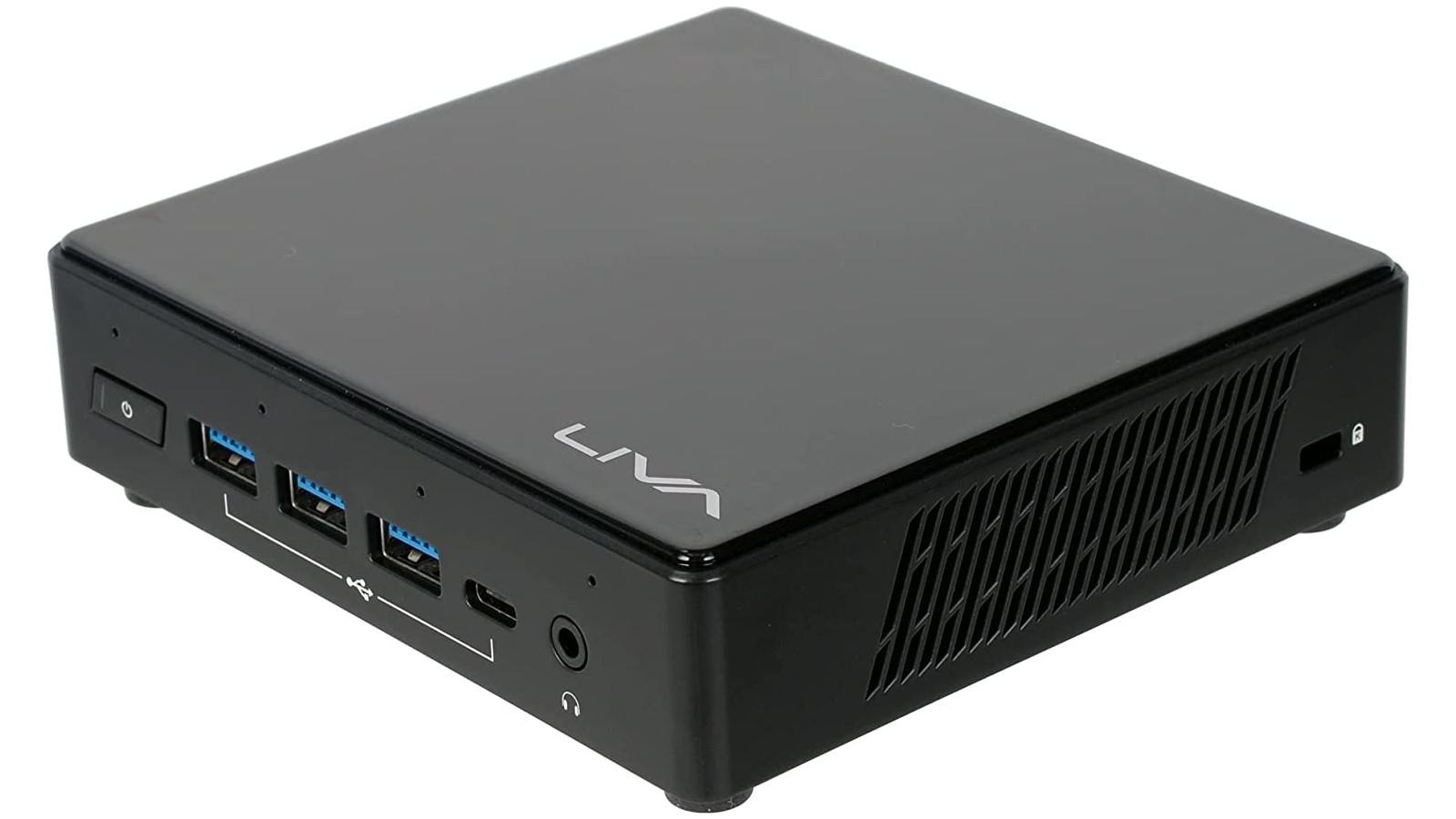
A relative newcomer to the market, the ECS EliteGroup LIVA Z3 is a tiny PC that uses a fanless design to run completely silently. Barely the size of a standard internet modem, the ECS EliteGroup LIVA Z3 is designed to be unobtrusive and keep out of the way. In a handy touch, it comes with a VESA mounting plate, meaning you can attach it to the rear of a compatible monitor, or mount it on a wall.
The ECS EliteGroup LIVA Z3 uses a Jasper Lake SoC CPU, released by Intel in 2021. As standard, it comes with 4GB of RAM, though there is capacity to upgrade this to 16GB if the user is so inclined. Default storage is 128GB, and it sports USB, USB-C and HDMI ports, as well as a headphone jack.
In use, the ECS EliteGroup LIVA Z3 runs in practical silence. There are no fans – there’d be no space for them in a unit this small – and passive cooling is achieved via vents in the sides of the chassis. Of course, this can only take you so far, so a number of other design choices have been made to help with heat dissipation. The Pentium Silver N6000 is not the fastest chip in this series, but unlike the faster N6005 SoC, it doesn’t require active cooling, negating the need for noisy fans. Also, its quad-core design makes use of thermal sensors that measure and adjust the clock speed in order to avoid overheating.
Reviews of the ECS EliteGroup LIVA Z3 consistently praise its silent operation, and if you want a PC that’s going to stay quietly in the background, it’s one of the best options you can buy – with a caveat. The fact that the LIVA Z3 has to use a slightly less powerful chip to avoid the need for active cooling does mean that it’s not the most powerful PC around. For general office use, watching TV and online browsing, it’s going to be absolutely fine – and let’s be fair, this is all baked into the premise of a silent PC. If you want to enjoy high-end gaming, 4K streaming and resource-hungry applications, you are likely going to have to put up with a little fan noise here and there. For prioritizing a silent, out-of-the-way PC above all else, the ECS EliteGroup LIVA Z3 is an excellent choice.
More of the quietest PCs
While the ECS EliteGroup LIVA Z3 is a great option, it might not be quite right for you. However, we've got four more fantastic quiet PCs with slightly different specs that might suit you better below.
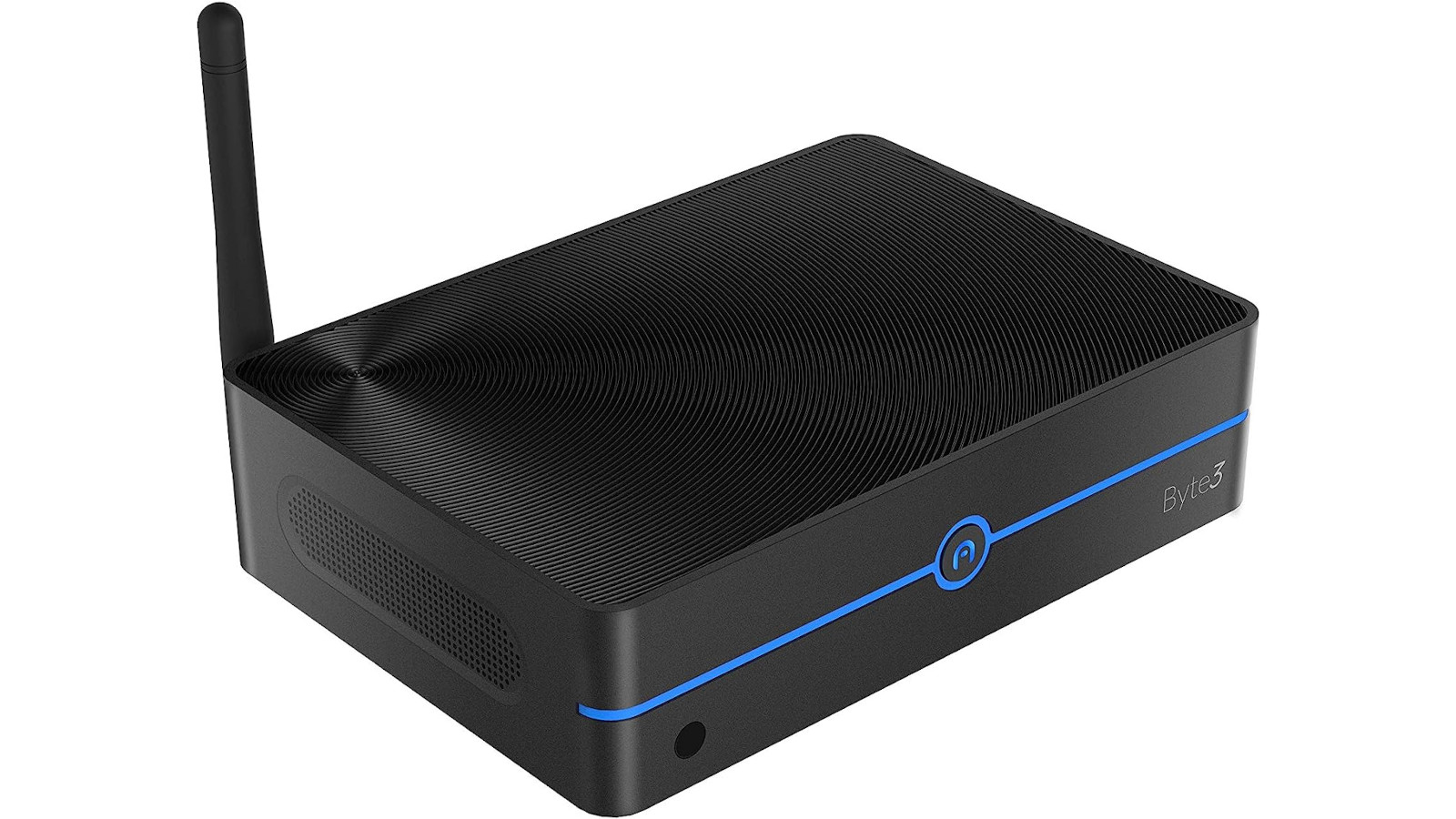
CPU: Intel Celeron J3455
RAM: 4GB
Weight: 0.875 lb
The stylish little blue-tinted box of a PC has clearly been designed with home entertainment in mind, and will slot in nicely to any living room setup. Its fanless design means it is, of course, silent in operation, and it incorporates an external Wi-Fi antenna for improved wireless performance – improving its ability to smoothly stream TV, which is what it’s built for, to the point that it even comes bundled with a TV-like remote that looks a lot like an Amazon Firestick. It has an M.2 slot and SATA port, meaning you can add more storage, but don’t get any ideas about expanding beyond 4GB of RAM – that ain’t happening. Still, it works well for streaming TV and light web browsing, and though it runs hot, it does run silent.
For
- Silent running
- Well optimised for streaming
- Included remote control
Against
- Gets very hot
- Can’t multi-task
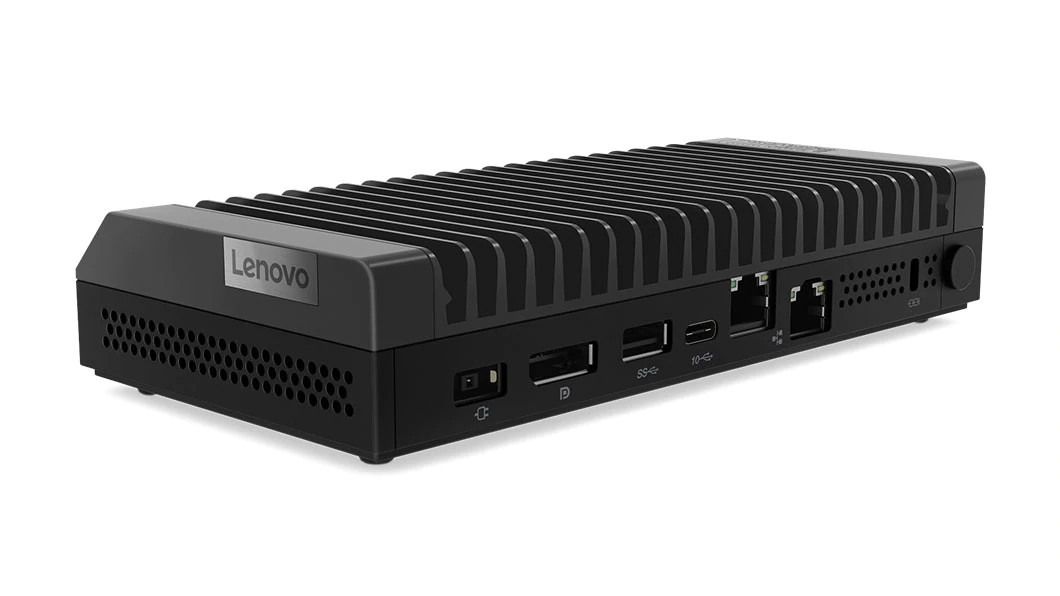
CPU: Core i3-8145U
RAM: 4GB
Weight: 1.6 lbs
The first two things that draw the attention upon seeing the Lenovo ThinkCentre M90n Nano IoT are its small size and its distinctive grille design. Both of these are due to the fact that it’s a fanless PC, meaning it’ll run in total silence, and is therefore perfect for crafting a home theatre setup, or ticking along out of the way in an office environment. It comes with two CPU options – you can get it cheaper with an Intel Celeron 4205U dual-core CPU, but we’d definitely recommend biting the bullet and paying an extra premium for the Core i3 CPU. You’ll have a much smoother time, especially considering that the PC only has 4GB of RAM, and doesn’t offer the facility to upgrade its memory.
For
- Completely silent
- Lightweight and unobtrusive
- Capable for office tasks
Against
- Only 4GB RAM
- And no capacity to upgrade
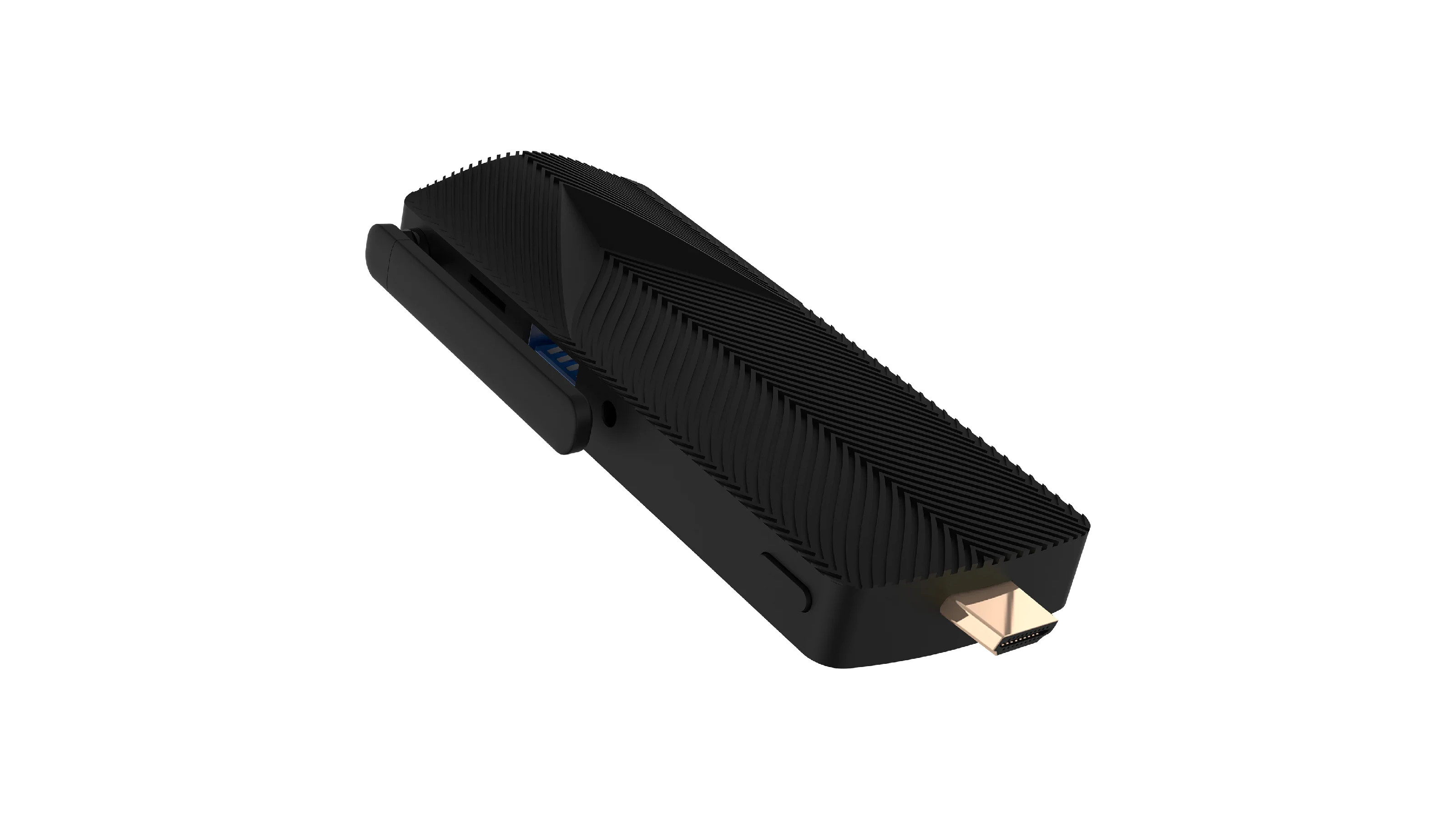
CPU: Intel Celeron J4125
RAM: 4GB
Weight: 1.27 lbs
It may just look like a simple USB stick, but Azulle’s Access4 is a fully functioning computer, crammed into an absolutely tiny form factor. Indeed, micro PCs such as this have become quite popular, as they’re perfectly suited for simply plugging into the back of a TV or a computer monitor, interfacing via a USB-C port. As you’d imagine, that slimline design doesn’t leave any room for fans of any kind – so there’s no running noise to speak of. The flipside, inevitably, is that the Access4 is pretty limited in what it can do, with processing and storage capacity meaning it’s really only suited to one task at a time. It’ll handle streaming well enough, so is a good choice for adding smart functionality to an older TV or monitor. Just be aware that, unlike a streaming stick, it won’t draw power from the TV, so you’ll need to plug it into its own outlet.
For
- Very portable design
- Completely silent
Against
- Very limited processing power
- Incurs some cable clutter
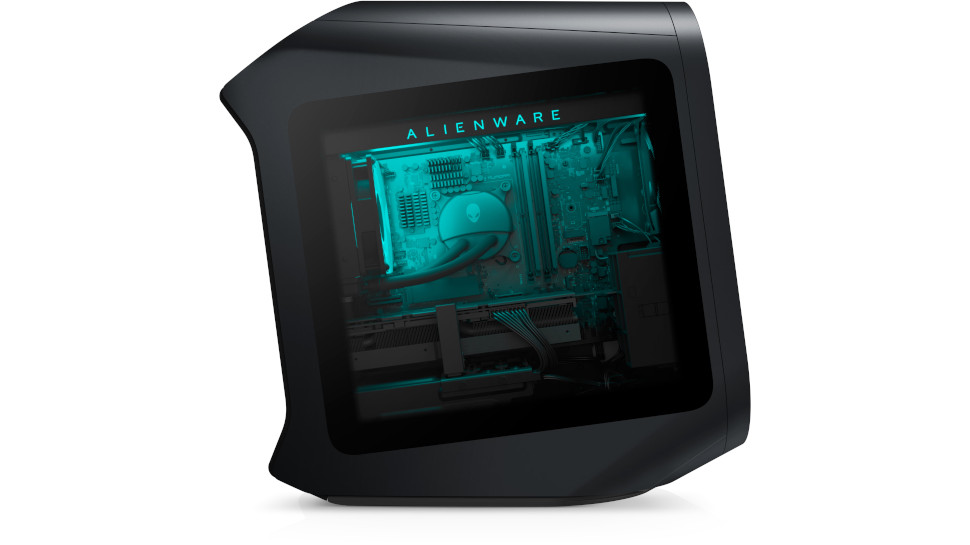
CPU: Intel Core i7-12700KF
RAM: 32GB
Weight: 35.3 lbs
A quiet gaming PC can be a tricky thing to find, as gaming requires a lot of computing power – which means noisy fans. However, the Alienware Aurora R13 does an impressive job of running nice and quietly even when performing demanding gaming tasks, thanks to its liquid cooling system. It’s much more powerful than any of the other computers we’ve featured, and if you’re looking for a quiet PC with a bit of muscle behind it, we can recommend this one. It’ll run top-end games in 4K at 60fps with no problems, whisper-quiet all the while. If you place real stress on the system with intensive tasks such as video editing, the cooler will struggle, and the fans will kick in with quite a bit of noise. But all in all this is one of the best quiet and powerful gaming PCs you can buy.
For
- Quiet even when gaming
- Distinctive design
- Games run very smoothly
Against
- Cooler sometimes struggles
- Very expensive
What to look for in a quiet PC
Why is a quiet PC important?
There are lots of reasons you might want a quiet PC. For instance, plenty of people use a PC as their main device for streaming, by casting it to a TV screen. When you’re watching your favorite movies and TV shows, you don’t want to be distracted by huge amounts of fan noise.
By a similar token, those who host a lot of virtual meetings or presentations on Zoom or similar platforms will not want a loud, whirring computer to be constantly humming away in the background whenever they are talking. In some PCs, the fans and internal microphones are placed annoyingly close to one another, which can make for an unpleasant experience on the other end of the call.
And it’s not just about the immediate user. Most of us share our living and working space with other people, and a loud PC can be a constant nuisance to another person trying to work or relax in the same room. If you want to keep your home life running smoothly, a quiet PC could definitely be the way to go!
Finally, quiet and silent computers can also be very useful for simple business tasks – particularly powering digital signs or billboards. As we’ve seen in our listings, many quiet PCs are small and unobtrusive things, easy to mount to wall or tuck away, meaning you can have them in your customer-facing business without bothering people with clutter or fan noise.
What are the trade-offs of a quiet PC?
With all this said, you may be wondering why everyone doesn’t use quiet PCs all the time. The fact of the matter is that there are trade-offs with quiet PCs that are worth being aware of before you decide to buy one.
The key factor is quite simply that a quiet or silent-running PC has a ceiling in terms of how powerful it can be. Remember that computer processing produces a lot of heat. Silent or fanless PC designs cannot run too hot, as they don’t have the means to cool down. Some will be designed with ventilation built into the chassis to help with heat dissipation, but this can only do so much.
Some quiet PCs employ liquid cooling systems, which circulate a liquid glycol solution through the CPU heatsink in order to allow the heat to dissipate. These tend to be quieter than air-cooled systems, but they still do involve fans, which create noise. Plus, they add to the price of the PC.
A quiet PC can be a fantastic addition to your home – as long as you’re aware of its limitations. If you value peace and quiet over computing power, and would rather stream a movie in peace than be able to run the latest games in 4K, then a quiet PC should fit right into your home life.

